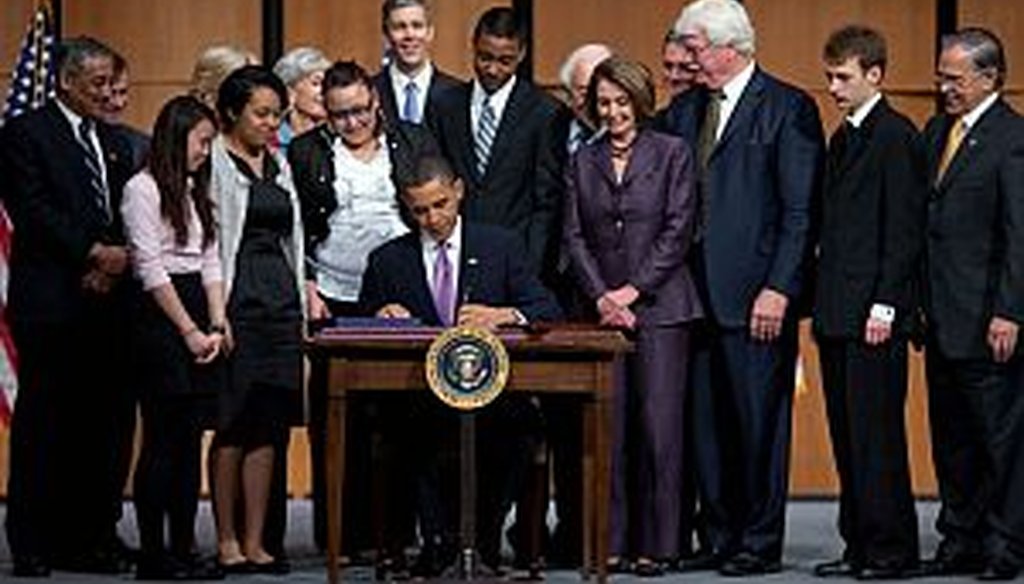Get PolitiFact in your inbox.

President Barack Obama signed the Health Care and Education Reconciliation Act of 2010 into law.
The Affordable Care Act, the Democrats' health care law, has often been defined more by falsehoods than truths.
Claims that the law is a "government takeover of health care," that it contains "death panels" and that it will put a 3.8 percent tax on home sales have frequently drowned out true claims about what the law actually does.
So with the U.S. Supreme Court holding arguments next week about whether the law is constitutional, we thought it was a good time to review our fact-checks and highlight the most common falsehoods.
We're featuring 10 of the most significant falsehoods that we've checked in the past year -- some of which also made our list last year.
Pants on Fire!
We'll start with those that earned our lowest rating, which we reserve for the most egregious, most ridiculous distortions.
• "If you sell your house after 2012 you will pay a 3.8 percent sales tax on it." This statement, which comes from a popular chain email, made our list last year too. But that hasn't stopped this ridiculous claim. Almost every week we hear from readers asking if home buyers are on the hook to pay for the health care plan. "THIS WILL BLOW YOU AWAY!!!!!" said one recent version of the email, adding that "under the new health care bill, all real estate transactions will be subject to a 3.8% sales tax." Not true. There is a new 3.8 percent tax on investment income for the wealthy, who might have to worry if they sell their houses at a substantial profit. But most Americans won't be touched by it. Pants on Fire!
• "The IRS is already planning on 19,500 new employees to administer" President Barack Obama's health care mandate. Former Republican presidential contender Jon Huntsman warmed up a debate at Dartmouth College in New Hampshire with this claim, trying to get a word in edgewise as his opponents attacked the law. It wasn't the first time we had heard variations on this claim, but it was one of the worst misstatements. Not only did the figure originate with Republicans on the House Ways and Means committee rather than the IRS, but also the IRS' own budget request estimated about 1,300 new employees would be needed in 2012 to administer the health care bill, mostly in non-enforcement roles. That earned him a Pants on Fire.
• An independent payment advisory board created by the health care reform law "can ration care and deny certain Medicare treatments." Talk about your oldies but goodies. Pat Boone is the frontman for a "scare granny" ad for the 60 Plus Association, targeted at five Democratic senators. The law creates a 15-member Independent Payment Advisory Board to suggest ways to limit Medicare’s spending growth, but the board may be overruled by Congress, it makes no decisions about individual care, and it is specifically forbidden from making any recommendations that would ration care, reduce benefits, raise premiums or cost-sharing or alter eligibility for Medicare. The 60 Plus Association was spending $720,000 on a campaign in Ohio targeted at the state's Democratic Sen. Sherrod Brown when PolitiFact Ohio ran the ad through the Truth-O-Meter and called it Pants On Fire.
• The national health care reform is "a government takeover of health care." We've heard it before -- so often that it was our 2010 Lie of the Year -- and we'll surely hear it again. This time it came from New Jersey Gov. Chris Christie. While the law gives the federal government a larger role in the health insurance industry, it relies overwhelmingly on the private market. In fact, the reform is projected to increase the number of citizens with private health insurance. As PolitiFact New Jersey noted, what Christie said has "been proven wrong over and over again, making his claim simply ridiculous." That's why it warranted a Pants On Fire.
• "Unions don't have to comply with Obamacare." That's what Republican controlled campaign group Crossroads GPS said in an ad. The claim focused on an element of the law that allows waivers to some employers. The health care law phases out annual benefit limits so that people wouldn’t be caught without coverage. The phase-out started in 2011, with new rules saying that all insurance plans must offer at least $750,000 in payouts per year. The number goes up every year so that by 2014 no caps at all will be allowed. Some unions were granted waivers from this provision, but so were corporations, which were not mentioned. The ad text says, "Over 185 union waivers. All exempt from Obamacare mandate," gives the impression that unions are unique in receiving them and also exempt from the entire law. Pants On Fire.
• The Affordable Care Act contains "a series of slush funds, set up to stay on the books automatically, with little or no oversight." So said House Majority leader John Boehner, R-Ohio, in a press release and video. PolitiFact Ohio found that the health care bill provides several pools of money that the secretary of Health and Human Services can disburse for purposes designated by the legislation. But slush funds? Merriam-Webster defines a "slush fund" as "an unregulated fund often used for illicit purposes." The money in question is designated for programs specifically defined by the law. Congress also has the power to oversee the bill’s implementation. Another Pants On Fire.
Wrong, but not as over the top
We also found plenty of statements that warranted the rating False. Here are some of the most significant:
• "Obama care … will kill jobs across America." The U.S. Chamber of Commerce made this claim in an ad attacking former Democratic Virginia Gov. Tim Kaine, who is running for the U.S. Senate, for his support of the health care law. PolitiFact had heard that claim before from House Majority Leader Eric Cantor, also of Virginia, and had rated it False. PolitiFact Virginia looked at the best projections available, based on how the law is actually written, and found that they do not suggest that the law will "kill" jobs. PolitiFact Virginia also looked at evidence provided by the Chamber to support its claim, including a brief from the Heritage Foundation, a conservative think tank that has been critical of the law. When the authors were asked whether their brief supported the claim, they responded that "our paper does not provide evidence that the (health care law) would cause job loss." So the Chamber got a False.
• "Preventive care … saves money for families, for businesses, for government, for everybody." This sweeping claim came from President Obama. Is preventive care a good idea? It can often save lives and keep patients healthier, and certain preventive measures may save money as well. But the findings of the Congressional Budget Office and and physicians who have studied the medical literature say otherwise, including a Feb. 14, 2008, article in the New England Journal of Medicine that noted that "the vast majority" of preventive health measures that were "reviewed in the health economics literature do not" save money. False.
• Eliminating "Obamacare" … "saves $95 billion a year." Republican presidential contender Mitt Romney liked this claim so much he made it at least twice in the past year, on Nov. 4, 2011, and again in January 2012. It's true that the law spends money providing tax subsidies to help people buy insurance and expanding the Medicaid health insurance for the very poor. But it also slows the growth of future spending on Medicare and imposes new taxes and fees to help offset the deficit. If you look at both spending and new revenue the actual savings from repealing the law would be much smaller -- $16 billion. And, over the long haul, repealing the law actually adds significantly to the deficit. So this claim earns a False.
• The Affordable Care Act "is not the law of the land." Florida's Republican Gov. Rick Scott used that claim as justification for refusing millions of dollars in grants to implement the health care law. Depending on how the Supreme Court rules, he might be right in the future, but he wasn't in December 2011. PolitiFact Florida found that federal judges had said parts of the law to be unconstitutional, and several more had said it was fine. But none had asked that the law not be implemented, leaving the last word to the U.S. Supreme Court, which is now on the case. False.
Our Sources
See individual items








































